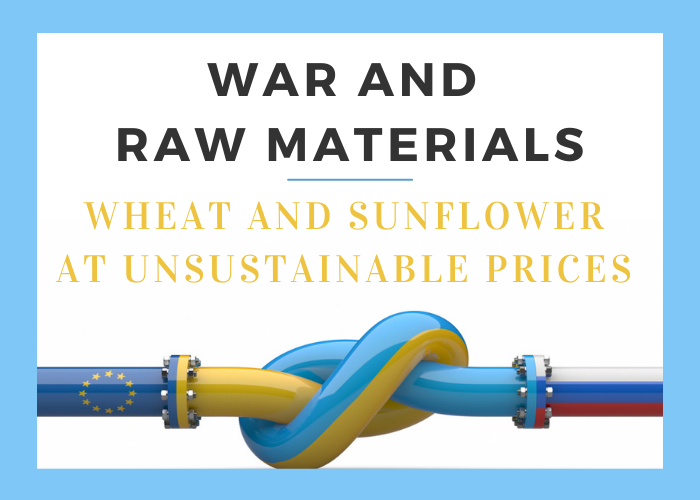War and food commodities crisisWE RISK RUNNING OUT OF FOOD
- 4 March 2022
- Posted by: Competere
- Category: SUSTAINABLE NUTRITION
No Comments

WAR AND FOOD COMMODITIES CRISIS
UNSUSTAINABLE WHEAT AND SUNFLOWER PRICES, LACK OF SUPPLY: WE RISK RUNNING OUT OF FOOD. SUPPLY CHAINS NEED TO BE URGENTLY REVIEWED
.
Rome, March 4, 2022 – “We can live without heating, but we cannot survive without eating.” This is the provoking statement made by Pietro Paganini, Founder and President of Competere – Policies for Sustainable Development, the European think tank that through its platform on Sustainable nutrition promotes policies for sustainable supply chains worldwide.
.
“Besides the catastrophic consequences that the war brings for the communities directly affected, in Europe the indirect effects on energy could soon become the least of the problems: in fact, the food sector is at risk of sinking. The uncontrolled and unbearable increase in agricultural commodity prices recorded in recent weeks – from wheat to sunflower oil – is threatening several countries.
.
The main cause of this unprecedented increase lies in the rigidity of the supply chain of some products, on which we have often relied also because of speculative and ideological policies. Approximately 80% of world exports of sunflower oil – chosen by operators after the indiscriminate boycott of palm oil to produce products destined for large-scale food distribution – comes from Ukraine and Russia: the closure of Black Sea ports is blocking imports, causing a surge in prices. Stocks are running out and sunflower is no longer available on the market, so much so that it has to be sold on the black market at prices above 2,000 USD per tonne. For Italy, which imports more than 60% from Ukraine, this is a real emergency.”
.
With these prices, unsustainable in the long term, and the serious risk of a lack of supply triggered by the ongoing conflict, producers might consider the possibility of resorting to alternative ingredients in order to satisfy the demand. “Which ones? – asks Paganini – As recent experience shows, soybean and rapeseed have structural problems. Palm oil turns out to be the only alternative; however, it is affected by a strong price increase – +37% in the last two weeks (Competere elaboration from Bursa Malaysia data), also due to the sudden increase – lacking sunflower oil – of the demand. Therefore, many companies will have to turn to palm oil after boycotting it for commercial and marketing reasons, paying double.
With these prices, unsustainable in the long term, and the serious risk of a lack of supply triggered by the ongoing conflict, producers might consider the possibility of resorting to alternative ingredients in order to satisfy the demand. “Which ones? – asks Paganini – As recent experience shows, soybean and rapeseed have structural problems. Palm oil turns out to be the only alternative; however, it is affected by a strong price increase – +37% in the last two weeks (Competere elaboration from Bursa Malaysia data), also due to the sudden increase – lacking sunflower oil – of the demand. Therefore, many companies will have to turn to palm oil after boycotting it for commercial and marketing reasons, paying double.
.
On a systemic level, the current crisis and the dark prospects we are facing indicate the vital need to have resilient and flexible supply chains: not necessarily targeted at our country, but rather diversified and able to absorb exogenous shocks such as those we are going through. “We are paying a high price for the effects of years of ideological and speculative policies that have led to the creation of rigid supply chains concentrated in a few countries. Supply chains that today, already frustrated by the pandemic and today with an ongoing conflict, risk breaking down irreparably” concludes Pietro Paganini.
On a systemic level, the current crisis and the dark prospects we are facing indicate the vital need to have resilient and flexible supply chains: not necessarily targeted at our country, but rather diversified and able to absorb exogenous shocks such as those we are going through. “We are paying a high price for the effects of years of ideological and speculative policies that have led to the creation of rigid supply chains concentrated in a few countries. Supply chains that today, already frustrated by the pandemic and today with an ongoing conflict, risk breaking down irreparably” concludes Pietro Paganini.
